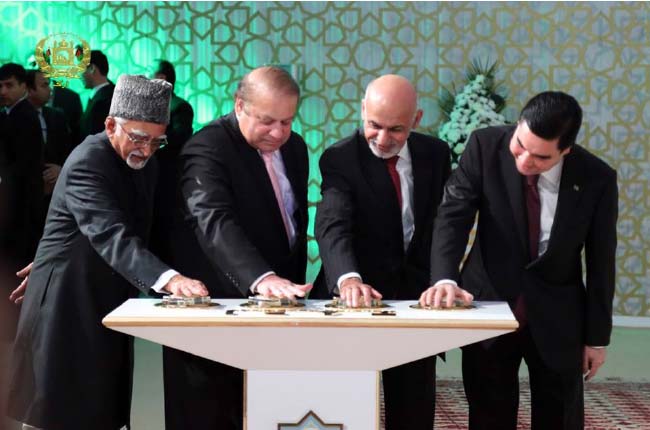Eventually after around two decades since it was first proposed, works on the Turkmenistan, Afghanistan, Pakistan, Iran (TAPI) gas pipeline project started last Sunday. The project is one of the biggest economic projects between Central and South Asian region, boosting prospects for trade and economic cooperation between the countries involved as well as peace and stability in Afghanistan and Pakistan. Officials of all four stakeholder countries have hailed the project as ‘game changer’, ‘peace project’ and ‘the dream project’ both for the region and the countries involved in the project. The gas pipeline project is expected to complete in four years and will cost around $10 billion. The project will transport 33 billion cubic meters of Turkmenistan’s gas over 1814 kilometers through Afghanistan to Pakistan and India. Suggesting the beginning of a new chapter in relations with Turkmenistan, Pakistan and India, President Ashraf Ghani said, “Today we witness a historical event; we talked about for decades; today we demonstrated our commitment.”
The project will be immensely lucrative four all the involved countries. Construction of the pipeline will create thousands of jobs in Afghanistan and will contribute to economic development of the country. Explaining the various economic projects in Afghanistan as part of the major TAPI project, President Ghani said that the gas pipeline will be part of a multi-branch project including optical fiber, power transmission and railways. The project’s management is carried out by Turkmenistan’s state-run Turkmen Gas. France’s Total had initially expressed interest to take over the management of the consortium, but after Turkmenistan rejected the company’s bid for extracting the country’s gas reserves, it withdrew from participating in the project. According to officials, Indian and Pakistani companies have signed contracts to import gas from Turkmenistan for the next 30 years.
The inauguration of the project is as fulfillment of dreams for all involving countries as they immensely need the pipeline project. The project was at the center of what was once called ‘the big game’ among some major world multi-national companies for exploiting the extractive reserves of the Central Asia. The TAPI project is bypassing Iran-Turkmenistan Peace Pipeline which was supposed to pass from Iran into the South Asian states. The economic initiative is drummed as pipeline diplomacy for the region aimed at boosting stability in the region and help peace in the region. Economic cooperation both with Pakistan and the region is one of the key ambitions of the Afghan national unity government. The Afghan government hopes the TAPI project and trade and business cooperation in other areas would boost relations between regional countries particularly Pakistan and will encourage Islamabad in the long run to help maintaining peace and stability in Afghanistan.
Though the project’s foundation was laid out during president Karzai’s presidency, the national unity government was staunch supporter of the initiative aimed at larger regional integration and economic cooperation. Ashraf Ghani’s administration’s policy has been seeking peace and stability in the country through promoting Afghanistan as an economic hub in the region connecting the South and Central Asian regions and expanding trades and economic cooperation between the regional countries. The Afghan government has been struggling to find ways to end the longstanding conflict in the country and end poverty which is one of the main factors behind the war and violence in the country. TAPI pipeline project is one of the key economic projects that will benefit Afghanistan’s economy immensely at a time when the country needs funding to provide jobs and economic welfare and sustain its military and governance spending. The government of Afghanistan will collect millions of dollars in revenue each year for passage of the Turkmenistan’s gas to the South Asian countries. On the other hand, the project is expected to create thousands of direct jobs inside Afghanistan easing the country’s urgent need for providing employment for its citizens.
However, the project is facing huge challenges. Insecurity in the western and southern regions of Afghanistan as well as some parts of Pakistan is one of the key challenges against it. The pipeline will pass through areas of the provinces of Herat, Helmand and Kandahar in Afghanistan, to Quetta and Multan in Pakistan, and finally ends in Fazilka of India. The pipeline route in Afghanistan and Pakistan passes through provinces that are highly volatile and some very insecure. There are occasional activities of militant groups operating against the government.
Securing the project will be a major test for determination of the countries implementing the project. Pakistan and Afghanistan see the project as instrumental for peace, security and socio-development in the regions lying on the project’s route. Afghanistan hopes that launch of the project will provide incentives for regional countries especially for Pakistan to demonstrate more commitment to the security of the project and help improving security in Afghanistan.
Political cooperation among the regional countries involved in the project is crucial for success of the project. Afghanistan, Pakistan and India need to work together to expand relations aimed at boosting trade and economic cooperation. Only through improved bilateral relations the countries involved in the project will be able cooperate based on long-term interests centered at economic cooperation. India and Pakistan are both highly energy thirsty countries. These highly populous countries are in urgent need of the Central Asian energy reserves and only accessing to Central Asian energy reserves can resolve the energy needs of these countries. Being as crossroads for the two South and Central Asian regions, Afghanistan has the exceptional inter-connectivity advantage in the region.
Despite the security challenges, the immense interest from the project for the stakeholder countries is a sufficient reason for the project to succeed. Both Afghanistan and Pakistan have the chance to test a new phase of relations based on economic cooperation around the TAPI project.

